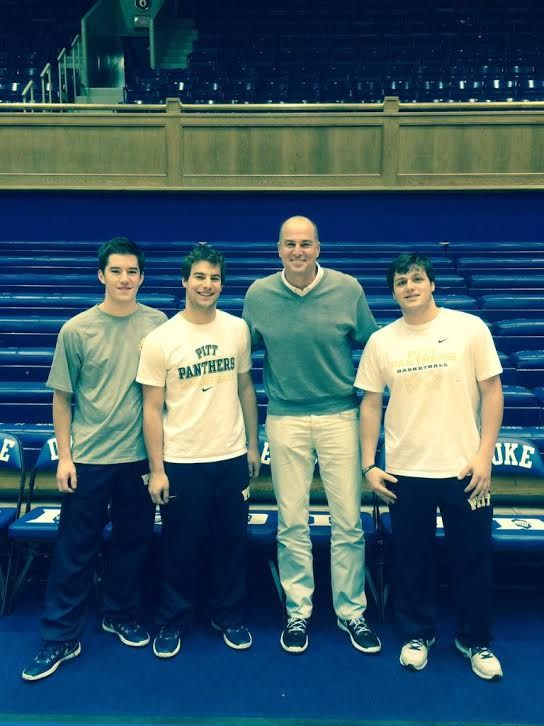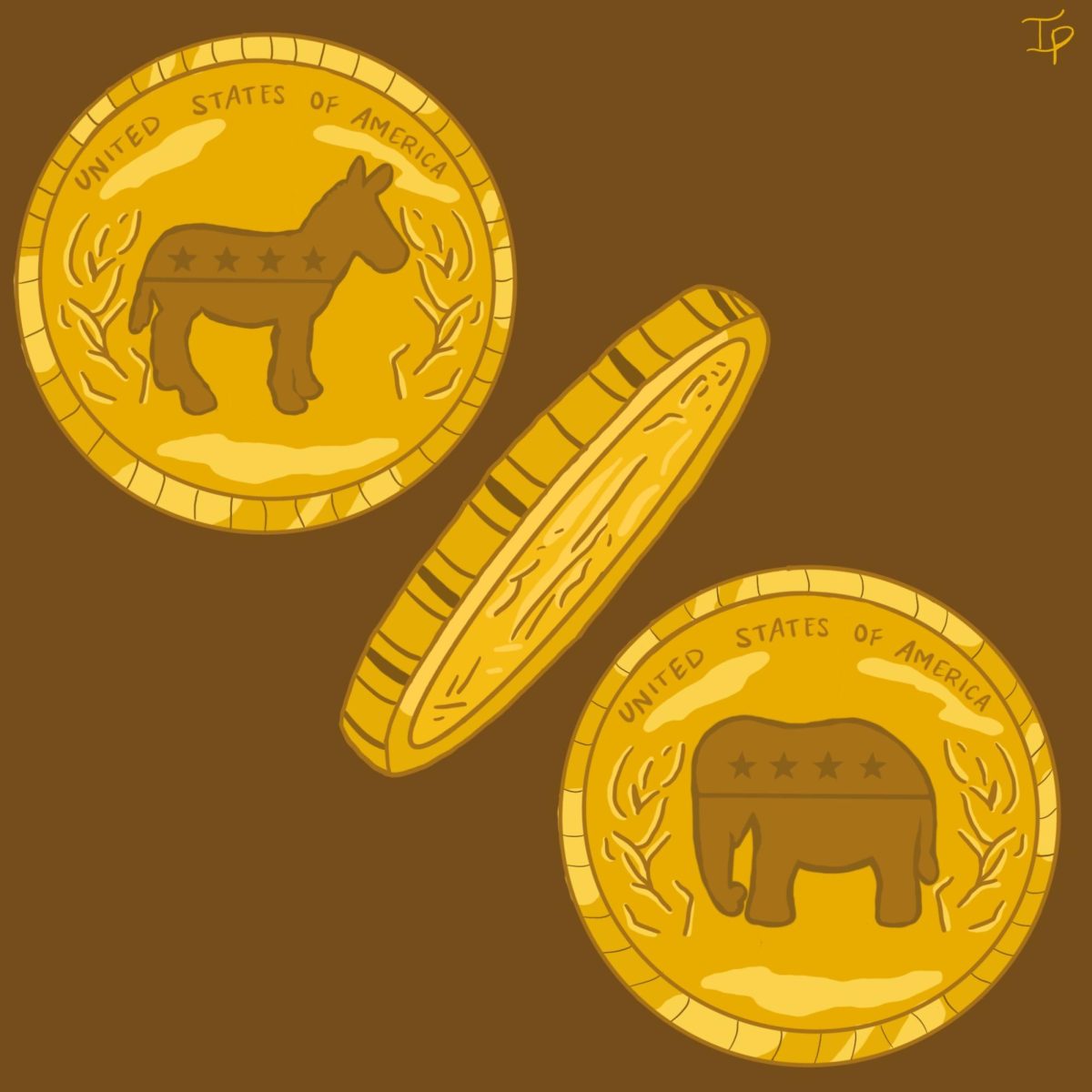The game before the game: Pitt’s basketball student managers compete in ACC games of their own
January 27, 2015
As student managers from the Pitt men’s basketball team begin to warm up at Petersen Events Center, people stop what they’re doing and watch. Something looks off.
“Y’all play for the team, bruh?” someone cleaning the building asks.
It approached 10 p.m. last Saturday, the night before the men’s team faces off against Louisville, and a cleaning crew worked its way around the main court’s mostly-empty arena, picking up trash and vacuuming. A group of men, wearing athletic clothing and sneakers, had just walked out of the tunnel opposite of the Oakland Zoo.
“Managers,” came the reply from one.
The man who asked the question looks on from the side of the court, intrigued, which makes sense. It’s an odd scene, because of the unfamiliar faces — unfamiliar, at least, to people only looking for Pitt’s varsity team.No. 10 Louisville was in town for its game against Pitt, but that game, a sellout, didn’t tip off until Sunday afternoon. Right now, in front of a handful of spectators, including Pitt players Sheldon Jeter and Cameron Johnson, it’s the managers’ time to play. Their usual tasks of filling water bottles and handing out towels will just have to wait a day.
Manager games in college basketball are the practical, entertaining result of shared circumstances. Visiting teams that aren’t within driving distance of a school almost always arrive a day early. These games, which usually take place late at night in the host’s main or practice gym, offer a break for the guests from the monotony of life on the road and a chance for both groups to connect with other managers who do the same, often thankless, job. The games may be unofficial, but that doesn’t mean the managers take the competition any less seriously. Like their varsity friends, they have a reputation to uphold, and with the number of manager games ever-increasing, the pressure heightens.
“A lot us love the game of basketball. A lot of us played in high school and just want to continue the passion for the game, and what better way to do it [than] with other managers,” Mike Lindenbaum, one of Pitt’s head managers said. “There’s a meaning to it. [You’re] not just playing pickup like, we are up at Trees Hall …You’re representing your school, and you’re playing pretty competitive games. So it’s a lot of fun.”
Recently, these managers versus managers games have become more common at Division I schools across the country.
The popularity increase is thanks in large part to ESPN college basketball analyst Jay Bilas, who often tweets out teams’ humorous scouting reports before games as well as photos from the contests to his 808,000 followers and counting.
“There will be trash talk and blood on the floor (and pros to clean it up),” he tweeted before an Iowa-Iowa State game.
Bilas said he dedicates so much of his social media time to these manager games because of his respect for those managers.
“I’m a big admirer of the job that managers do. I think they’re the hardest working people in basketball. You get to know them … You go to practices, and you get to know the managers at different schools, and they’re great kids. They’re the first ones there, last ones to leave,” Bilas said. “After a while, you find out, ‘hey, there’s a game tonight’.”
Bilas, who played at Duke from 1982 to 1986, said when he was a student, the managers at Duke played other schools. Bilas began the shoutouts while in Iowa City, Iowa, for an Iowa-Iowa State game last month after a couple managers from the home team gave him their scouting report of the opposition. That’s where the above tweet originated, for the December instate rivalry game.
“This kind of thing would have been a little blurb entry into an article that you’d do if this were 20 years ago, or get mentioned on a game broadcast or something,” Bilas said. “But now more people get a kick out of it, and do a little bit more with it.”
Lindenbaum’s first manager game took place during his freshman year. The current fifth-year senior played against West Virginia when the Mountaineers made the one-and-a-half-hour drive to Oakland.
Before this year, Pitt’s only other manager game over the past four seasons came against Penn State last December, which Pitt’s managers won.
Lindenbaum, an accounting major, and Will Supowitz, the other head manager, wanted to make the games against other schools more than an occasional occurrence.
They’ve succeeded. Pitt has a record of 4-3 and has played almost a full conference schedule thus far, plus non-conference opponent Florida Gulf Coast, with more games scheduled.
“We’re closer. The Pitt managers are closer. We get along a little bit better,” Lindenbaum said, regarding the increase in games. “And especially, switching over to the ACC, I think it’s something they’ve done previously in the past. The Big East didn’t really do it, other than rivalry games. Down in the ACC, a lot of the schools are a little bit closer together and familiar with each other. I think that’s probably the biggest reason why.”
Pitt director of basketball operations Brian Regan, who has worked for the team since 2007, often serves as the middleman when organizing the matchups. Lindenbaum goes to him before games to ask for the opponent’s head manager’s contact information. Regan then contacts that team’s director of operations, and the process develops from there.
Within the last week, the ACC managers decided to create an online spreadsheet with everyone’s contact information to make scheduling easier.
“It’s really starting to come together as something more than a pickup game,” Lindenbaum said.
The group’s social media presence has also helped it line up games. The Pitt managers (@PittBballMngers) joined Twitter last March, during the NCAA Tournament. Chase Goldstein, the head manager at FGCU, found the team through their Twitter before the schools played over break and reached out via the social media outlet about playing to their almost 900 followers.
The team often tweets insider pictures of the varsity-level team, as well as results of their own games with the occasional smack talk and humor thrown in. An early tweet from the managers read “Tough transition from Gatorade to Powerade water bottles, but we found a way to fight through the adversity.”
Back on the court, Louisville is a man short, having traveled with four, so the game becomes four-on-four with the rule that, following a turnover, all players must come back across half court to avoid any unfair fast break situations.
Otherwise, the contest, like others similar to it, consists of two 20-minute halves with no shot clock or officiating. The game mostly uses a running clock, which stops only after made baskets with two minutes or less to go in each period. The ball is checked in after out of bounds or fouls, which are called on merit.
The Louisville Cardinals do fine with what they have, overcoming a five-point halftime deficit to beat Pitt, 62-51.
An hour or so after the game ends, Maninder Singh, a sophomore mechanical engineering major, sits lined up with friends in the Petersen Events Center lobby, hoping to get good seats for tomorrow. When asked what he knew about managers playing other schools, he explained that he knew they played after seeing an Oakland Zoo tweet about it once but thought their games happened after the main one, not before.
“I had no idea they were playing today,” Singh said. “But then when I heard the buzzer go off, we were kind of confused as to what was going on.”
Regan agreed, saying that while the tradition may still live underground, it is growing.
“It’s almost like a culture that goes on that no one knows about or has an idea about,” Regan said.



